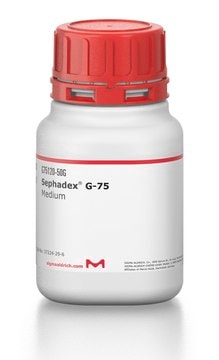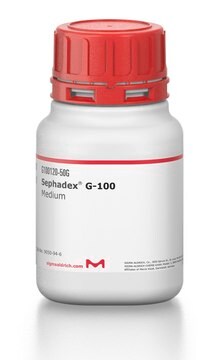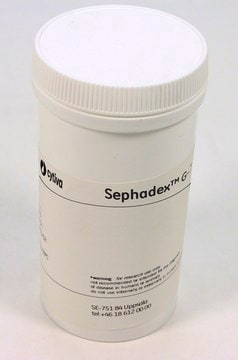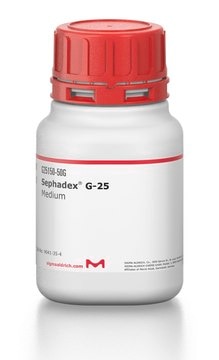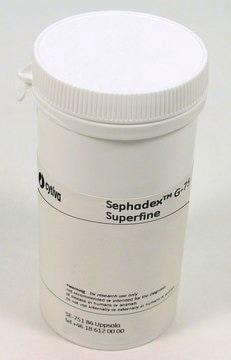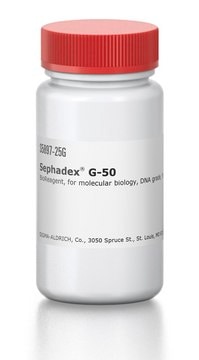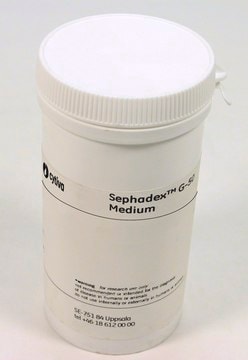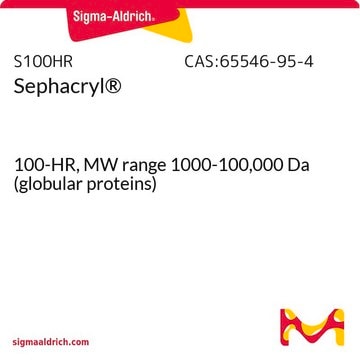Recommended Products
Quality Level
technique(s)
buffer exchange: suitable
matrix active group
phase
swelling
1 g swells to 12-15 mL
bead size
20-50 μm
application(s)
life science and biopharma
compatibility
Cytiva
Looking for similar products? Visit Product Comparison Guide
General description
Sephadex® G-75 is well-established gel filtration medium for desalting and buffer exchange of large biomolecules >80,000 molecular weight.
Sephadex® is a gel filtration medium prepared by crosslinking dextran with epichlorohydrin. Different types of Sephadex™ differ in their degree of cross-linking and hence in their degree of swelling and their molecular fractionation range. Sephadex® G-75 is for larger molecules.
Sephadex® is a gel filtration medium prepared by crosslinking dextran with epichlorohydrin. Different types of Sephadex™ differ in their degree of cross-linking and hence in their degree of swelling and their molecular fractionation range. Sephadex® G-75 is for larger molecules.
Application
Sephadex® G-75 is a gel filtration media used in gel filtration chromatography and protein chromatography. It has been used for desaltation process to study the production, purification, and immobilization of l-asparaginase II (ASNase II) in chitosan nanoparticles (CSNPs).
Legal Information
Sephadex is a registered trademark of Cytiva
Sepharose is a trademark of Cytiva
replaced by
Product No.
Description
Pricing
Storage Class Code
11 - Combustible Solids
WGK
WGK 3
Flash Point(F)
Not applicable
Flash Point(C)
Not applicable
Personal Protective Equipment
dust mask type N95 (US), Eyeshields, Gloves
Certificates of Analysis (COA)
Search for Certificates of Analysis (COA) by entering the products Lot/Batch Number. Lot and Batch Numbers can be found on a product’s label following the words ‘Lot’ or ‘Batch’.
Already Own This Product?
Find documentation for the products that you have recently purchased in the Document Library.
Customers Also Viewed
John G Vontas et al.
The Biochemical journal, 362(Pt 2), 329-337 (2002-02-21)
A novel glutathione S-transferase (GST)-based pyrethroid resistance mechanism was recently identified in Nilaparvata lugens [Vontas, Small and Hemingway (2001) Biochem. J. 357, 65-72]. To determine the nature of GSTs involved in conferring this resistance, the GSTs from resistant and susceptible
Engineering a Disulfide Bond in Recombinant Manganese Peroxidase Results in Increased Thermostability
Reading, N.S., and Aust, S.D.
Biotechnol. Progress, 16(3), 326-333 (2000)
Sofia R Pauleta et al.
Biochemistry, 43(35), 11214-11225 (2004-09-16)
The gene for pseudoazurin was isolated from Paracoccus pantotrophus LMD 52.44 and expressed in a heterologous system with a yield of 54.3 mg of pure protein per liter of culture. The gene and protein were shown to be identical to
L Shilpa Satheesh et al.
Indian journal of experimental biology, 49(5), 366-374 (2011-05-28)
Antimicrobial activity of protease inhibitor isolated from Coccinia grandis (L.) Voigt. has been reported. A 14.3 kDa protease inhibitor (PI) was isolated and purified to homogeneity by ammonium sulfate precipitation (20-85% saturation), sephadex G-75, DEAE sepharose column and trypsin-sepharose affinity
Elham Bahreini et al.
Nanoscale research letters, 9(1), 340-340 (2014-08-13)
This paper describes the production, purification, and immobilization of l-asparaginase II (ASNase II) in chitosan nanoparticles (CSNPs). ASNase II is an effective antineoplastic agent, used in the acute lymphoblastic leukemia chemotherapy. Cloned ASNase II gene (ansB) in pAED4 plasmid was
Our team of scientists has experience in all areas of research including Life Science, Material Science, Chemical Synthesis, Chromatography, Analytical and many others.
Contact Technical Service